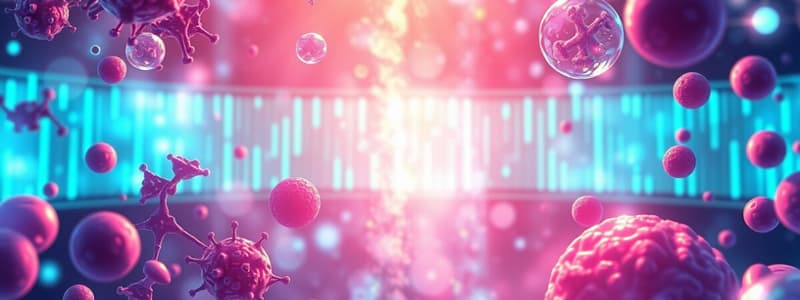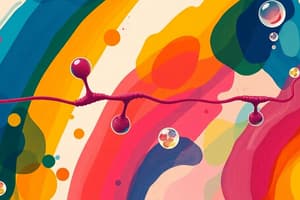Podcast
Questions and Answers
What is pharmacodynamics primarily concerned with?
What is pharmacodynamics primarily concerned with?
- How drugs affect the body (correct)
- The classification of drug sources
- How the body affects drugs
- The therapeutic uses of drugs
Which of the following routes are considered enteral drug administration routes?
Which of the following routes are considered enteral drug administration routes?
- Subcutaneous and topical
- Topical and intravenous
- Intravenous and intramuscular
- Sublingual and rectal (correct)
What characterizes an agonist in pharmacology?
What characterizes an agonist in pharmacology?
- Blocks receptors
- Activates receptors (correct)
- Inhibits enzyme activity
- Prevents drug absorption
Which factor primarily influences the metabolism of drugs in the body?
Which factor primarily influences the metabolism of drugs in the body?
What is the therapeutic window in pharmacodynamics?
What is the therapeutic window in pharmacodynamics?
Which type of drug interaction occurs when one drug reduces the effect of another?
Which type of drug interaction occurs when one drug reduces the effect of another?
What is the primary focus of personalized medicine in pharmacology?
What is the primary focus of personalized medicine in pharmacology?
Which process is primarily involved in the excretion of drugs from the body?
Which process is primarily involved in the excretion of drugs from the body?
Flashcards are hidden until you start studying
Study Notes
Overview of Pharmacology
- Definition: Study of drugs, their actions, effects, and therapeutic uses.
- Branches:
- Pharmacodynamics: How drugs affect the body.
- Pharmacokinetics: How the body affects drugs (absorption, distribution, metabolism, excretion).
Drug Classifications
- By Source:
- Natural (plant, animal, mineral)
- Synthetic (chemically manufactured)
- By Effect:
- Agonists: Activate receptors.
- Antagonists: Block receptors.
- By Use:
- Therapeutic: For treatment of diseases.
- Prophylactic: For prevention of diseases.
Drug Administration Routes
- Enteral: Oral, sublingual, rectal.
- Parenteral: Intravenous, intramuscular, subcutaneous.
- Topical: Skin, eyes, mucous membranes.
Pharmacokinetics Components
- Absorption: Movement of drug into the bloodstream.
- Factors: Formulation, route, blood flow.
- Distribution: Dispersion of drug throughout the body.
- Factors: Blood flow, tissue binding, barriers (e.g., blood-brain barrier).
- Metabolism: Biochemical modification of drugs.
- Liver is the primary organ for drug metabolism.
- Excretion: Removal of drugs from the body.
- Primarily through kidneys; also in bile, sweat, saliva.
Pharmacodynamics Principles
- Mechanism of Action: How a drug produces its effects (e.g., receptor binding, enzyme inhibition).
- Dose-Response Relationship: Relationship between drug dose and its effect.
- Therapeutic Window: Range between effective dose and toxic dose.
Adverse Drug Reactions
- Types:
- Side Effects: Predictable and often manageable.
- Allergic Reactions: Immune response, can be severe.
- Toxicity: Harmful effects from overdose or prolonged use.
Drug Interaction
- Types:
- Additive: Combined effect is equal to the sum of individual effects.
- Synergistic: Combined effect is greater than the sum.
- Antagonistic: One drug reduces the effect of another.
Clinical Pharmacology
- Pharmacotherapy: Use of drugs to treat diseases.
- Personalized Medicine: Tailoring drug therapy based on individual genetic makeup and response.
Regulatory and Ethical Considerations
- Drug Approval Process: Clinical trials, FDA approval in the U.S.
- Ethics: Informed consent, risk-benefit analysis, patient safety.
Future Directions
- Biologics: Use of biological products (e.g., monoclonal antibodies).
- Gene Therapy: Modifying genetic material to treat or prevent disease.
- Precision Medicine: Targeted therapies based on genetic and molecular profiling.
Overview of Pharmacology
- Focus on study of drugs, including their actions, effects, and therapeutic applications.
- Two main branches:
- Pharmacodynamics examines how drugs exert their effects on the body.
- Pharmacokinetics deals with how the body interacts with drugs through absorption, distribution, metabolism, and excretion.
Drug Classifications
- Categorized by source:
- Natural: derived from plants, animals, or minerals.
- Synthetic: created through chemical manufacturing.
- Classified by effect:
- Agonists activate receptors, mimicking natural substances.
- Antagonists block receptor activity, inhibiting effects.
- Classified by use:
- Therapeutic drugs are used for disease treatment.
- Prophylactic drugs are used for disease prevention.
Drug Administration Routes
- Enteral administration includes methods such as oral, sublingual, and rectal routes.
- Parenteral administration involves methods like intravenous, intramuscular, and subcutaneous injections.
- Topical administration targets the skin, eyes, and mucous membranes.
Pharmacokinetics Components
- Absorption refers to how a drug enters the bloodstream, influenced by formulation, route, and blood flow.
- Distribution involves the drug's dispersion in the body, impacted by blood flow, tissue binding affinities, and barriers like the blood-brain barrier.
- Metabolism entails the biochemical alteration of drugs, with the liver being the primary organ for this process.
- Excretion is the body's elimination of drugs, mainly via kidneys and also through bile, sweat, and saliva.
Pharmacodynamics Principles
- Mechanism of action defines how drugs produce effects, involving receptor binding and enzyme inhibition.
- Dose-response relationship explores how varying drug doses result in different effects.
- Therapeutic window highlights the range between doses that are effective and those that are toxic.
Adverse Drug Reactions
- Side effects are predictable and manageable reactions to drugs.
- Allergic reactions represent immune responses that can sometimes be severe.
- Toxicity refers to harmful impacts resulting from overdoses or prolonged exposure.
Drug Interaction
- Additive interactions yield a combined effect equal to the sum of different drug effects.
- Synergistic interactions produce a greater effect than the sum of individual drugs.
- Antagonistic interactions occur when one drug reduces or negates the effect of another.
Clinical Pharmacology
- Pharmacotherapy focuses on using drugs to manage and treat diseases.
- Personalized medicine tailors drug therapy to individual genetic and biological responses, enhancing efficacy and safety.
Regulatory and Ethical Considerations
- Drug approval involves rigorous clinical trials and regulatory oversight, such as FDA approval in the U.S.
- Ethical considerations include informed consent, risk-benefit analyses, and maintaining patient safety.
Future Directions
- Biologics incorporate biological agents like monoclonal antibodies in therapies.
- Gene therapy seeks to modify genetic materials for disease prevention or treatment.
- Precision medicine employs targeted therapies based on patients' genetic and molecular profiles, leading to more effective treatments.
Studying That Suits You
Use AI to generate personalized quizzes and flashcards to suit your learning preferences.



